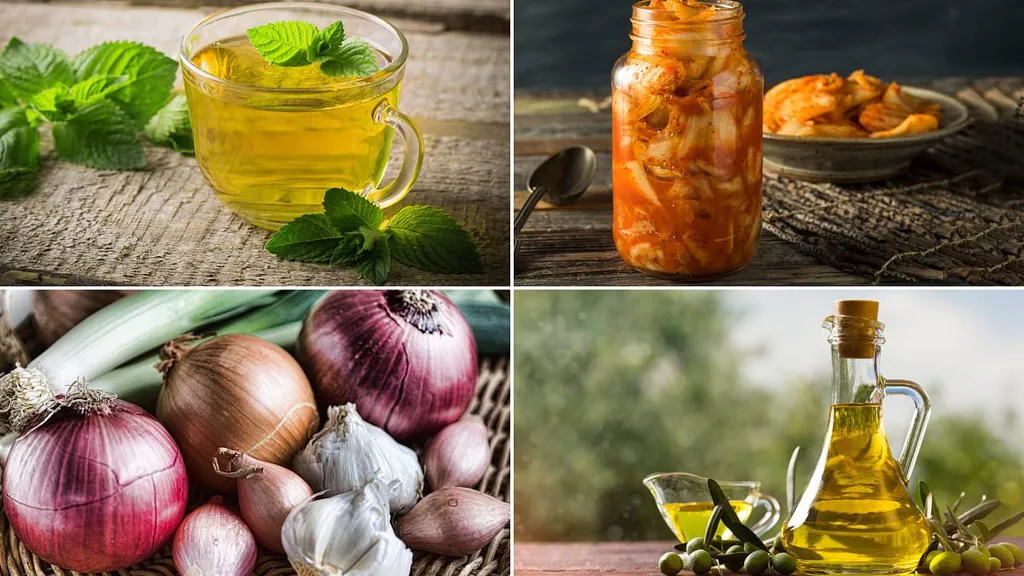Is it possible that not only are our gut microbes linked to immunity, mental wellbeing and weight gain, but they also play a role in endometriosis and the intense pain it can cause?
Endometriosis is where womb-like tissue grows elsewhere in the body, such as on the bowel, ovaries or pelvis walls - each month, this tissue reacts as if it's in the womb - thickening, breaking down and often bleeding. But this blood has no easy exit route and can become trapped, causing intense inflammation and pain.
Now it's emerged that women with the condition often have a distinct make-up in their gut microbiome, the community of microbes found there.
"This suggests that having more or less of specific bacteria could influence the risk of developing endometriosis - and offers the possibility that manipulating the make-up of gut microbes may help ease some of the symptoms."
In fact, scientists are already running trials with endometriosis patients exploring how probiotics (beneficial bacteria), prebiotics (food sources for beneficial bacteria) and dietary changes might rebalance the gut microbiome, reduce inflammation and alleviate their pain.
"The finding may ultimately lead to new treatments for this and other pain-related conditions - which would be a breakthrough."
Scientists now believe that the reason endometriosis pain can be so intense is that the immune system and hypersensitive nerve cells in the spinal cord amplify it. But the gut microbiome may have a role here - by influencing how our nerves handle pain.
"Scientists are running trials with endometriosis patients exploring how probiotics, prebiotics and dietary changes might reduce inflammation and alleviate pain," writes DR EMILY LEEMING
The gut is packed with nerves that connect directly to the brain through the vagus nerve, a major nerve which runs from the brain down to the gut - thinking is that gut nerves help shape how we feel and respond to pain.
This was highlighted in a 2017 study with mice published in eLife showing changes in gut microbiome impact brain areas linked to pain; essentially molecules produced by some gut microbes could worsen or improve it.
"Findings like these have led to human trials of probiotics in conditions similar to endometriosis which show modest but meaningful reduction in pain."
The Diet Connection
The link between endometriosis and diet has been suspected for some time. Women with endometriosis are three times more likely to have IBS than those without it. This connection is likely due to shared genes controlling inflammation and hormones such as oestrogen.
Cook With Nature's Ibuprofen
Olive oil contains oleocanthal, a compound reducing inflammation similarly to ibuprofen by blocking inflammatory enzymes, reported a 2005 study. Consuming around 50g (about four tablespoons) of extra-virgin olive oil daily provides a small regular dose. If cost concerns arise alternate with other anti-inflammatory options like rapeseed flaxseed or avocado oils.
Fish For Pain Relief
women taking 2000mg omega-3s daily over two months experienced improved levels of relief reported journal PLOS One Inflammation raises prostaglandins chemicals triggering painful cramps irritating nerves regularly eating oily fish salmon mackerel sardines provide benefits portion two-three times weekly similar level omega-3s
Pop A Probiotic?
Lactobacillus gasseri OLL2809 tested specifically patients experienced less menstrual cramping placebo no side effects research animals suggest probiotic boost fighting immune cells check GP start particularly take regular medication
Sip Peppermint Tea
bloating common symptom bloating experience according study Journal Obstetrics Gynaecology Canada peppermint oil capsules menthol antispasmodic relaxes bowel muscles easing cramps bloating gas available counter usual recommendation capsule three times day hour before meals peppermint tea lower menthol offer mild relief cups provide gentle relief bloating
AND DON’T FORGET FERMENTED FOOD
Fermented foods yoghurt kimchi grow beneficial bacteria lower general body reported Cell direct studies lacking promising involves chronic Adding sauerkraut brown rice topping scrambled eggs stir-fries enjoy breakfast kefir support health potentially ease symptoms try stirring sauerkraut through brown rice using kimchi topping scrambled eggs stir-fries enjoy yoghurt kefir breakfast ...BUT AVOID ONIONS Avoiding certain FODMAPs fermentable sugars onions garlic wheat beans fruits ease symptoms low-FODMAP short-term plan identify personal triggers cutting gradually reintroducing range small Human Reproduction following significantly relieve improve quality life reducing related Many gluten trigger symptoms likely approach complex ideally seek dietitian try
